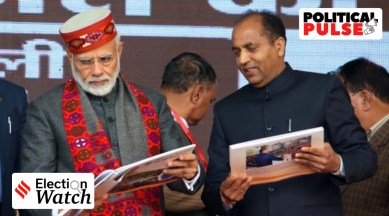Election Watch | Hattis get tribal status, could impact results in 9 Himachal seats
The Trans-Giri Hattis have been seeking reservation since 1967, BJP first recognised the demand during the 2009 Assembly polls

The Union Cabinet, chaired by Prime Minister Narendra Modi, Wednesday approved a Constitution amendment Bill that seeks to grant tribal status to the Hatti community living in the Trans-Giri region of Himachal Pradesh’s Sirmaur district.
The nod for Hattis came along with tribal status to a community in Chhattisgarh and two in Tamil Nadu.
monthly limit of free stories.
with an Express account.
The Hattis form an electorally influential community in Himachal Pradesh, and the move might boost the ruling BJP’s chances in the coming Assembly elections.
The BJP had swept the 2017 Assembly elections, winning 44 of the 68 seats. The 2022 election, on the other hand, scheduled for November, is turning out to be a three-cornered fight between the BJP, Congress and new-entrant Aam Aadmi Party, which is fresh off the win in Punjab.
In this backdrop, support of the three lakh members of the Hatti community can prove decisive. While they are concentrated in the four constituencies of Sirmaur district (Shillai, Paonta, Renuka, and Pachhad), they play a significant role in at least nine seats in Shimla and Sirmaur.
Union Information and Broadcasting Minister Anurag Thakur, who addressed the media after the Cabinet meeting, and belongs to Hiamchal, said people belonging to the community in the state had been asking for inclusion in the ST list for more than 50 years.
Pointing out that the Hatti community in the Jaunsar region of Uttrakhand had already been given tribal status, he said: “The Trans-Giri region of Sirmaur shares the border with Jaunsar, and the two have a cultural similarity. It is a historic decision. I thank PM Modi for this.”
The ST status will also impact 144 gram panchayats. Additionally, if the proposal for tribal status for Simaur is cleared, it will ensure reservation benefits for communities living in the area.
Himachal had earlier submitted a proposal for notifying Trans-Giri in Sirmour district, the Dodra Kwar sub-division of Shimla, areas of Shimla and Kullu as Scheduled Areas. The ministry examined the proposal but did not consider it due to “want of crietria”.
A close-knit community, the Hattis are spread across the Trans-Giri (nestled between the Giri and Tons rivers) and Jaunsar Bawar regions in Himachal Pradesh and Uttarakhand, respectively. The larger area was once part of the Sirmaur royal estate until the British conquered it in 1815.
The Trans-Giri Hattis have been seeking reservation since 1967, when tribal status was accorded to members living in the Jaunsar Bawar area. Over the years, the demand kept gaining strength with resolutions passed at Khumblis, which are traditional, powerful councils similar to the Khap panchayats in Haryana. They remain unchallenged by the panchayati raj system.
The BJP first recognised the demand during the 2009 Assembly elections by incorporating it in its manifesto, the first party to do so. The community then put its weight behind the party, and the promise kept reappearing in subsequent BJP manifestos.
In 2014, then BJP national president Rajnath Singh promised the grant of ST status to Hattis during a rally at Nahan in Sirmaur. The BJP, in the recent past, benefited from the community’s support in the form of gains in parliamentary elections especially in Shimla, which was once a Congress stronghold.
The Hattis traditionally sell homegrown vegetables, crops, meat and wool in small markets called ‘haats’, deriving their name from the same. Trans-Giri and Jaunsar Bawar, also the names of clans within the community, have similar traditions. There is a rigid caste system within the Hattis: the Bhat and Khash constitute the upper castes, while the Badhois are below them. Inter-caste marriages among these castes are traditionally frowned upon.